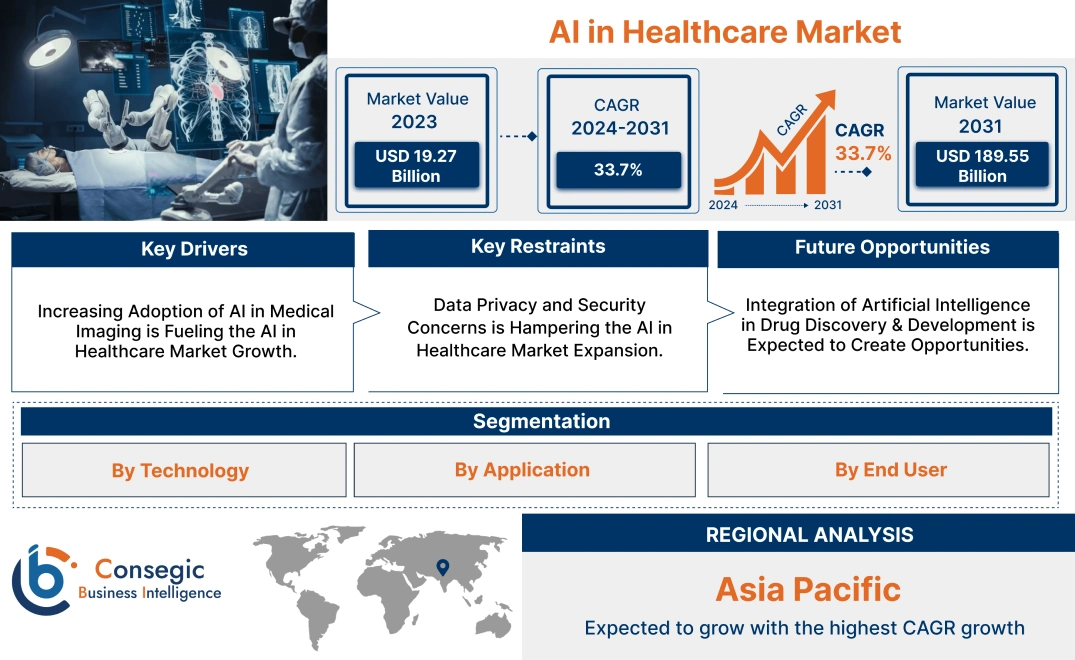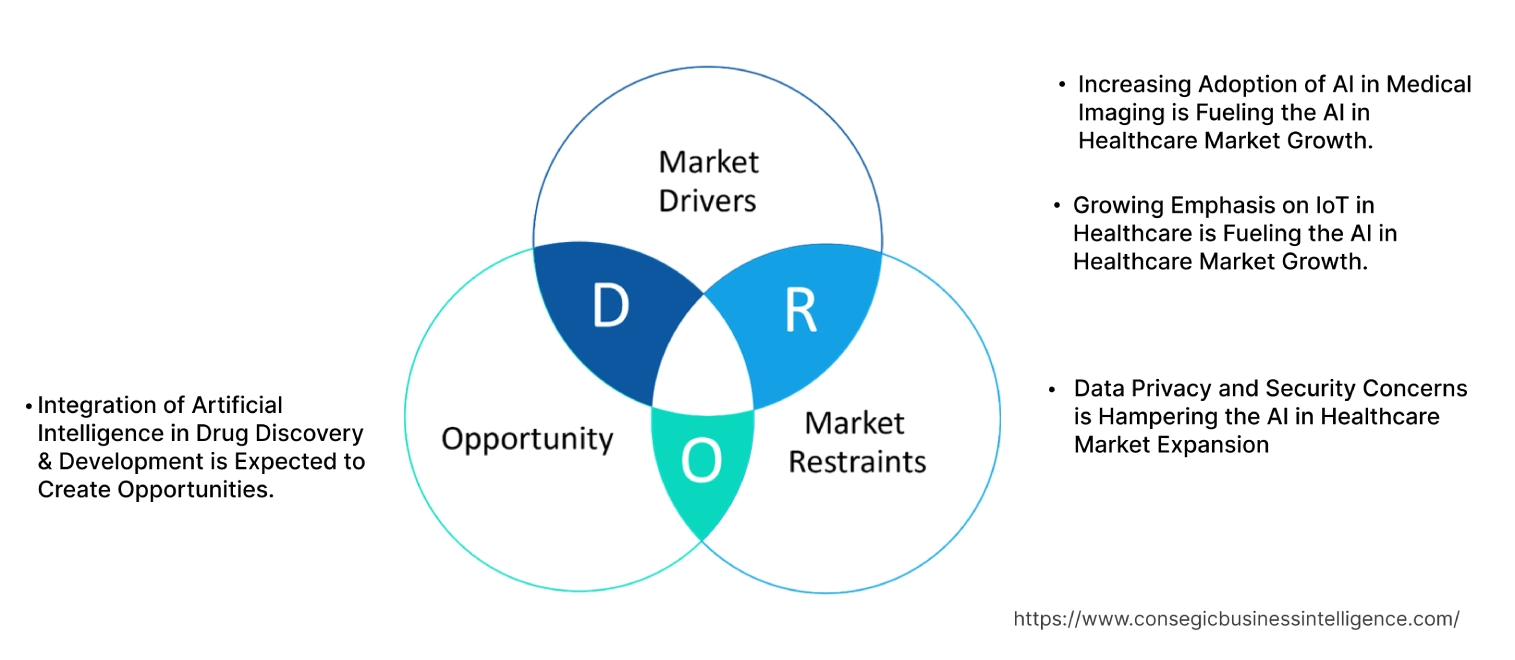AI in Healthcare Market Size:
AI in Healthcare Market size is growing with a CAGR of 33.7% during the forecast period (2024-2031), and the market is projected to be valued at USD 189.55 Billion by 2031 from USD 19.27 Billion in 2023.
AI in Healthcare Market Scope & Overview:
Artificial intelligence (AI) is a technology that enables computers and machines to simulate human learning, comprehension, problem-solving, decision-making, creativity, and autonomy. AI in healthcare refers to the use of machine learning, natural language processing, deep learning, and other AI technologies to assist and improve patient care and healthcare system operations.
In Healthcare, AI is employed in a spectrum of applications including drug discovery and development, medical imaging, clinical decision support, administrative tasks, patient monitoring, healthcare information systems, and wearables among others. A wide range of applications make AI a critical technology for pharmaceutical and biotechnology companies, healthcare providers, research institutions, and others. The growing adoption of AI in medical imaging, the adoption of IoT in healthcare, the growing demand for patient data management, and advancements in AI tools are some of the prominent factors driving the market.
AI in Healthcare MarketDynamics - (DRO) :
Key Drivers:
Increasing Adoption of AI in Medical Imaging is Fueling the AI in Healthcare Market Growth.
The increasing adoption of artificial intelligence in medical imaging is one of the prominent factors fuelling the market. AI-powered tools and techniques are advancing the way medical images are analyzed and interpreted, leading to more accurate, efficient, and timely diagnoses.
AI algorithms analyze medical images, such as X-rays, CT scans, and MRIs, to identify patterns and anomalies indicative of disease. This helps radiologists and other healthcare professionals to detect diseases earlier, leading to more timely and effective treatment. Additionally, AI algorithms automatically segment different tissues and organs in medical images, making it easier for radiologists to analyze and quantify abnormalities, improving the accuracy of diagnoses. AI is also being used to develop new imaging modalities, such as AI-enhanced ultrasound and AI-powered PET scans. These new modalities provide more detailed and accurate information about the human body, leading to improved diagnostic accuracy and treatment planning.
- For instance, in October 2023,Samsung Medison, an affiliate of Samsung Electronics, showcased AI-automated measurement functions BiometryAssist and ViewAssist, which measure and automatically annotate fetal growth indicators in ultrasound. This highlights the adoption of AI in medical imaging systems including ultrasound systems.
As a result, by improving the accuracy, efficiency, and accessibility of medical imaging, AI is supporting accurate medical imaging, further driving the growth of the market.
Growing Emphasis on IoT in Healthcare is Fueling the AI in Healthcare Market Growth.
The rapid adoption of the Internet of Things (IoT) in healthcare represents a fundamental transformation in the healthcare sector, serving as a prominent factor for AI in healthcare market expansion. IoT refers to the collective network of connected devices and the technology that facilitates communication between devices and the cloud, as well as between the devices themselves.
The adoption of IoT in healthcare is primarily fueled by the rise in connected medical devices, smart sensors, and intelligent monitoring systems that enable real-time health monitoring & data access resulting in improved patient health, experience & enhanced healthcare operations. Healthcare companies and organizations are increasingly integrating IoT for patient monitoring, asset tracking, and healthcare facility optimization creating the requirements for AI algorithms to analyze, identify patterns, and make informed predictions.
- For instance, according to the report published by T‑Mobile USA, Inc. in April 2022, 3.2 million IoMT (Internet of Medical Things) devices were deployed globally as of 2021. This indicates a growing focus on leveraging technology, including AI for healthcare improvements.
As IoT technology continues to advance, and as the number of connected medical devices grows, the potential for AI-driven healthcare solutions is expanding.
Key Restraints :
Data Privacy and Security Concerns is Hampering the AI in Healthcare Market Expansion.
One of the primary constraints hindering the widespread adoption of AI in healthcare is the profound concern over data privacy and security. Healthcare data is highly sensitive, containing personal and medical information that, if compromised, poses concerns of resulting in serious consequences for individuals and healthcare organizations. One of the primary concerns is the risk of data breaches. Healthcare organizations are frequent targets of cyberattacks, and breaches expose sensitive patient information to unauthorized access. This leads to identity theft, financial fraud, and reputational damage for both the healthcare provider and the affected individuals.
Another significant concern is the potential for algorithmic bias. AI algorithms are trained on large datasets. In biased datasets, the AI models perpetuate discriminatory practices. This results in biased diagnoses, treatment recommendations, and other negative outcomes. Furthermore, the increasing complexity of AI systems and the rapid pace of technological advancements are making it difficult for healthcare organizations to keep up with the latest security best practices. This creates vulnerabilities for cyberattacks. As a result, data privacy and security concerns remain a significant barrier to the widespread adoption of AI in healthcare.
Future Opportunities :
Integration of Artificial Intelligence in Drug Discovery & Development is Expected to Create Opportunities.
AI offers a transformative approach to traditional drug discovery processes, accelerating timelines and reducing costs in successful drug development. By analyzing vast amounts of biological and chemical data, AI-powered tools support rapid and accurate identification of potential drug targets and design innovative molecules. Additionally, AI algorithms support the prediction of drug properties and side effects, optimizing drug design and minimizing risks. AI's ability to identify optimal patient populations, optimize clinical trial design, and predict patient outcomes leads to more efficient and effective clinical trials. By automating routine tasks and streamlining processes, AI significantly reduces the costs associated with drug discovery and development. This creates potential for the adoption of AI in drug discovery & development.
- For instance, in July 2024, Exscientia plc, a technology-driven drug design and development company, announced it would be expanding its work with Amazon Web Services to use its artificial intelligence services to power its platform for end-to-end drug discovery.
As a result, as AI continues to evolve, its impact on drug discovery and development is expected to grow, propelling increased investment in AI-powered healthcare solutions and further boosting the market.
AI in Healthcare Market Segmental Analysis :
By Technology:
Based on technology, the market is categorized into machine learning, natural language processing, computer vision, and others.
Trends in the Technology:
- Leveraging machine learning (ML) to predict disease outbreaks and patient outcomes with greater accuracy.
- Developing voice-activated systems for patient interaction, medical record updates, and prescription management.
The machine learning segment accounted for the largest AI in healthcare market share in 2023.
- Machine Learning is a subset of Artificial Intelligence that enables systems to learn and improve from data without explicit programming. Rather than relying on predefined rules, ML models utilize algorithms and statistical models to identify patterns and make predictions based on the data they are exposed to.
- Machine Learning is advancing the adoption of AI in healthcare by analyzing massive amounts of clinical data to identify patterns and predict medical outcomes with high accuracy.
- ML algorithms present the capability to analyze patient records, and medical imaging, and discover new therapies, leading to more effective treatments. They enable precise disease diagnosis, personalized treatment plans, and early detection of potential health issues.
- One of the most significant applications of ML in healthcare is precision medicine. By leveraging supervised learning techniques, ML algorithms analyze patient-specific data to predict the most effective treatment options.
- Thus, machine learning technology contributes a significant share in the healthcare sector by leveraging its ability to learn from data and make accurate predictions.
The natural language processing segment is expected to grow at the fastest CAGR over the forecast period.
- Natural Language Processing is a subset of artificial intelligence that empowers computers to comprehend and interact with human language. By merging computational linguistics and statistical modeling NLP enables machines to recognize, understand, and generate text and speech.
- In the healthcare sector, NLP is supporting various aspects of patient care and medical research. NLP algorithms efficiently extract crucial information from unstructured medical records, such as patient history, symptoms, diagnoses, and medications.
- By analyzing vast amounts of medical records, NLP supports the identification of patterns, leading to early disease detection, improved patient outcomes, and more effective treatment strategies.
- Moreover, NLP-powered virtual health assistants are able to answer patient queries, provide reliable health information, and schedule appointments.
- For instance, in April 2023, HCA Healthcare and Augmedix announced a partnership aimed at accelerating the development of artificial intelligence-enabled ambient documentation solutions for acute care providers. These use automatic speech recognition technology and natural language processing to convert clinician-patient conversations into medical notes. These notes are then reviewed and finalized by care teams before being integrated into electronic health records (EHRs).
- Thus, as NLP technology continues to advance, its applications in healthcare are expanding, promising to further enhance patient care and medical research and creating AI in healthcare market opportunities.
By Application:
Based on the application the market is categorized into drug discovery & development, medical imaging, clinical decision support, administrative tasks, patient monitoring, healthcare information systems, wearables, and others.
Trends in the Application:
- Enhancing surgical precision and minimizing risks in robotic-assisted surgery.
- Using AI to diagnose and treat mental health conditions.
- Adoption of AI-powered wearable devices and remote monitoring systems to enable continuous patient monitoring and early intervention.
- Adoption of AI in precision medicine.
The medical imaging segment accounted for the largest market share of 31.77% in 2023.
- Artificial Intelligence plays a crucial role in medical imaging by extracting valuable insights from medical images, further enhancing diagnostic accuracy, early disease detection, and treatment planning.
- AI algorithms analyze medical images such as X-rays, CT scans, MRIs, and ultrasounds, identifying patterns and details missed by physicians.
- Key applications of AI in medical imaging include image segmentation, where AI accurately delineates specific structures within an image, and disease detection, where AI identifies potential abnormalities.
- Additionally, AI improves image quality, enabling better visualization and diagnosis. By analyzing imaging data along with other clinical information, AI predicts disease progression and treatment response, leading to personalized medicine.
- AI-powered tools are particularly valuable in modalities such as mammography for detecting breast cancer, CT scans for assessing lung disease, MRI for analyzing brain and spinal cord conditions, and ultrasound for fetal development and abdominal imaging. These applications demonstrate the significant impact of AI in improving patient care and outcomes.
- Thus, AI is supporting medical imaging by enhancing diagnostic accuracy, increasing efficiency, and addressing the growing demand for diagnostic services.
The drug discovery & development segment is expected to grow the fastest CAGR over the forecast period.
- Artificial intelligence accelerates drug discovery and development by analyzing vast biological and chemical datasets, AI identifies potential drug targets.
- AI-powered tools generate novel molecular structures, speeding up the discovery of new drug candidates. Virtual screening techniques enable rapid identification of potential drug candidates.
- In clinical trials, AI optimizes patient recruitment, and trial design, and reduces costs. Additionally, AI automates data analysis and report generation, ensuring regulatory compliance.
- The benefits of AI in drug discovery and development are significant. It reduces the time required to identify and develop new drugs, increases the success rate of drug development by accurately predicting drug efficacy and safety, and lowers development costs by streamlining processes and minimizing the need for physical experiments. Hence, owing to the major role served by AI in drug discovery & development, innovative AI solutions are being developed.
- For instance, in December 2024, SoftServe, an IT consulting and digital services provider, introduced its newest Generative AI solution, Drug Discovery, alongside its partner NVIDIA. Built with NVIDIA BioNeMo Blueprints, the reference workflows that accelerate the development and deployment of AI, SoftServe’s new solution will streamline drug development. SoftServe's Gen AI Drug Discovery solution assists researchers, developers, and pharmaceutical companies in generating novel drug candidates.
- Thus, considering the aforementioned factors, the adoption of AI in drug discovery & development is expected to create AI in healthcare market opportunities in the upcoming years.
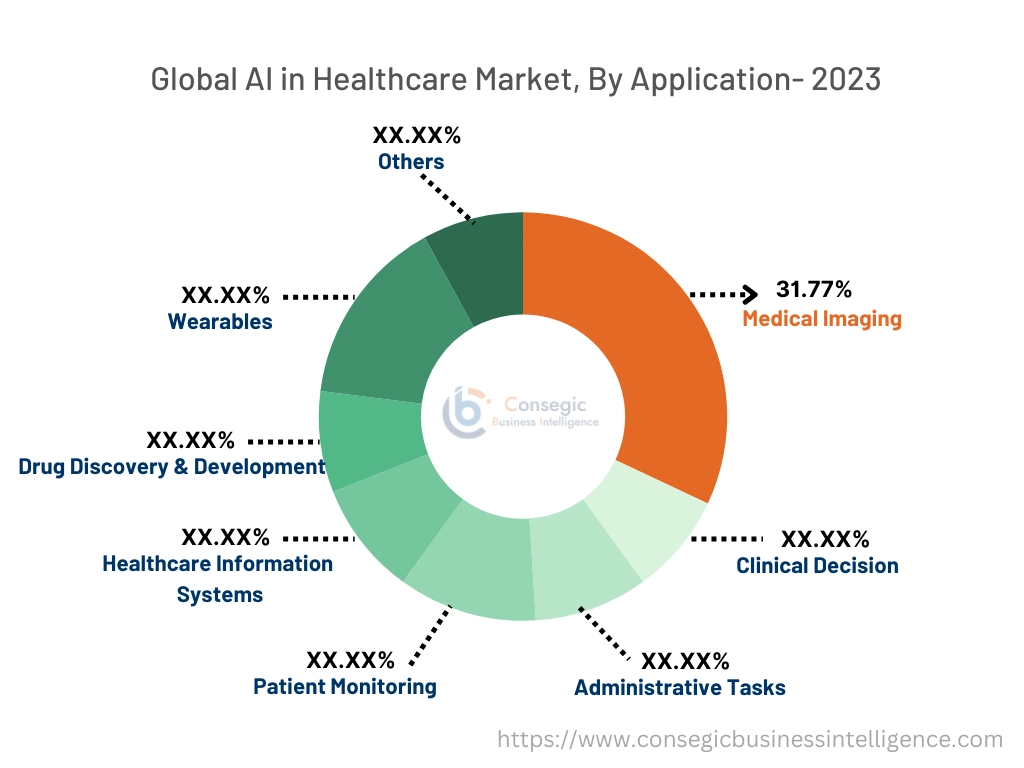
By End User:
Based on end users, the market is categorized into pharmaceutical and biotechnology companies, healthcare providers, research institutions, and others.
Trends in the End User:
- Growing emphasis on patient engagement and communication tools is a trend influencing the adoption of AI.
- The rising demand for personalized healthcare is supporting the adoption of AI.
The healthcare provider segment accounted for the largest AI in Healthcare market share in the year 2023.
- Healthcare providers, including hospitals and clinics, serve as primary end-users of AI in the healthcare industry.
- AI is widely employed for hospital system implementation, remote patient care capabilities, medical imaging, administrative tasks, and clinical decision support among others.
- Healthcare providers are leveraging AI to enhance various aspects of patient care. AI-powered tools analyze medical images with greater accuracy, leading to earlier disease detection and more precise diagnoses.
- Additionally, AI provides clinicians with evidence-based recommendations to improve decision-making. By automating routine tasks like medical record analysis and appointment scheduling, AI increases efficiency and reduces administrative burdens.
- Moreover, AI-powered wearable devices and remote monitoring systems enable continuous patient monitoring, allowing for early intervention and improved patient outcomes.
- Additionally, the prospect of improved patient outcomes and operational efficiencies offered by innovative application cases is driving healthcare organizations to make the requisite investments in AI.
- For instance, in July 2024, Chi-Mei, deployed AI copilots built with Microsoft’s Azure OpenAI Service to lighten workloads for doctors, nurses, and pharmacists.
- Overall, as per AI in healthcare market analysis, healthcare providers are the primary users of AI.
The pharmaceutical and biotechnology companies segment is expected to grow at the fastest CAGR over the forecast period.
- Pharmaceutical and biotechnology companies are heavily investing in AI to support drug discovery and development as AI algorithms help analyze vast biological and chemical datasets to identify potential drug targets, accelerating the discovery process.
- By optimizing clinical trial design, patient recruitment, and data analysis, AI streamlines clinical trials leading to faster and more efficient drug development.
- Additionally, AI enables the development of personalized medicine by analyzing patient-specific data, such as genetic information and medical history. This allows for tailored treatment plans and improved patient outcomes.
- Thus, in conclusion, AI is advancing the pharmaceutical and biotechnology industry by accelerating drug discovery and development. By leveraging advanced algorithms and techniques, AI is enabling faster and more efficient drug development, personalized medicine, and improved patient outcomes.
Regional Analysis:
The regional segment includes North America, Europe, Asia Pacific, the Middle East and Africa, and Latin America.
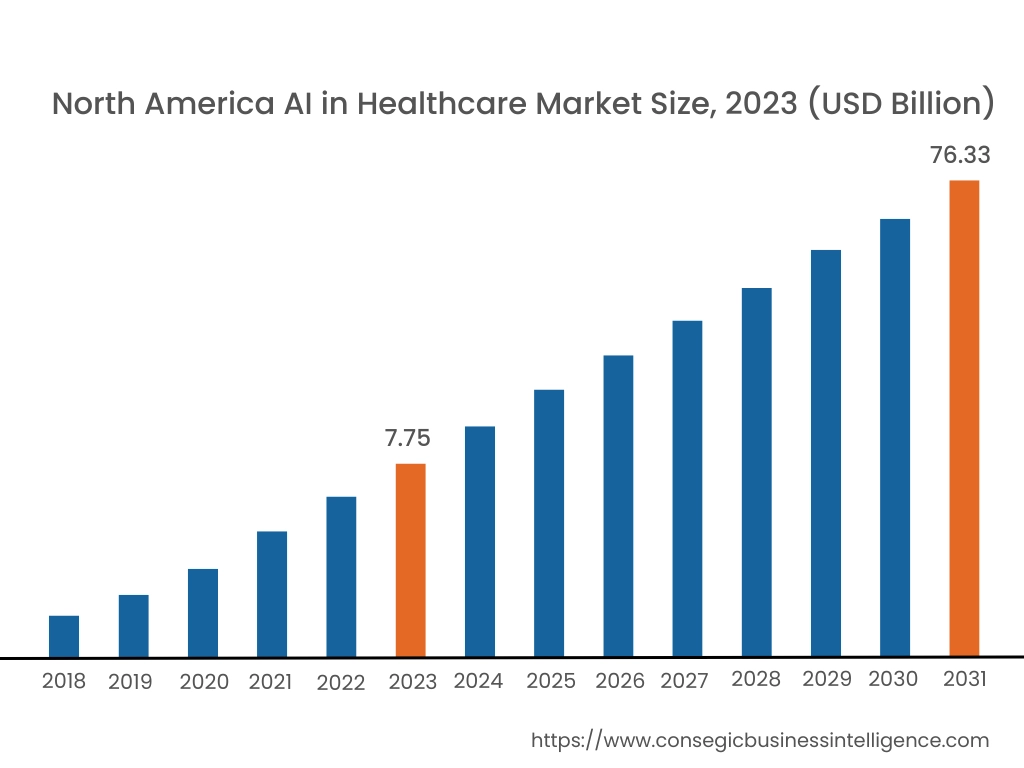
In 2023, North America accounted for the highest market value at 40.20% and was valued at USD 7.75 Billion in 2023 and is expected to reach USD 76.33 Billion in 2031. In North America, the U.S. accounted for the highest market share of 71.15% during the base year of 2023. North America is the dominant region in global AI in healthcare market analysis. This dominance is attributed to several key factors. The accelerated adoption of digitalization in healthcare services in North America is a key factor. Additionally, the region boasts a well-developed healthcare infrastructure, with state-of-the-art hospitals, clinics, and research institutions. This infrastructure provides a solid foundation for the adoption and integration of AI technologies. North America focuses on early adoption of new technologies, including AI. Healthcare providers and researchers in the region are increasingly adopting AI-powered tools and techniques to improve patient care and research outcomes. Additionally, government support for the adoption of AI in healthcare is driving the market across the region.
- For instance, in April 2024, the S. Department of Health and Human Services (HHS) publicly shared its plan for promoting responsible use of artificial intelligence (AI) in automated and algorithmic systems by state, local, tribal, and territorial governments in the administration of public benefits.
Moreover, North America boasts a robust healthcare infrastructure with advanced diagnostic and treatment facilities, leading to requirements for AI solutions. North America also presents leading healthcare providers, technology companies, and research institutions. These organizations are actively investing in AI-enabled healthcare solutions, driving innovation and AI in healthcare market trends.
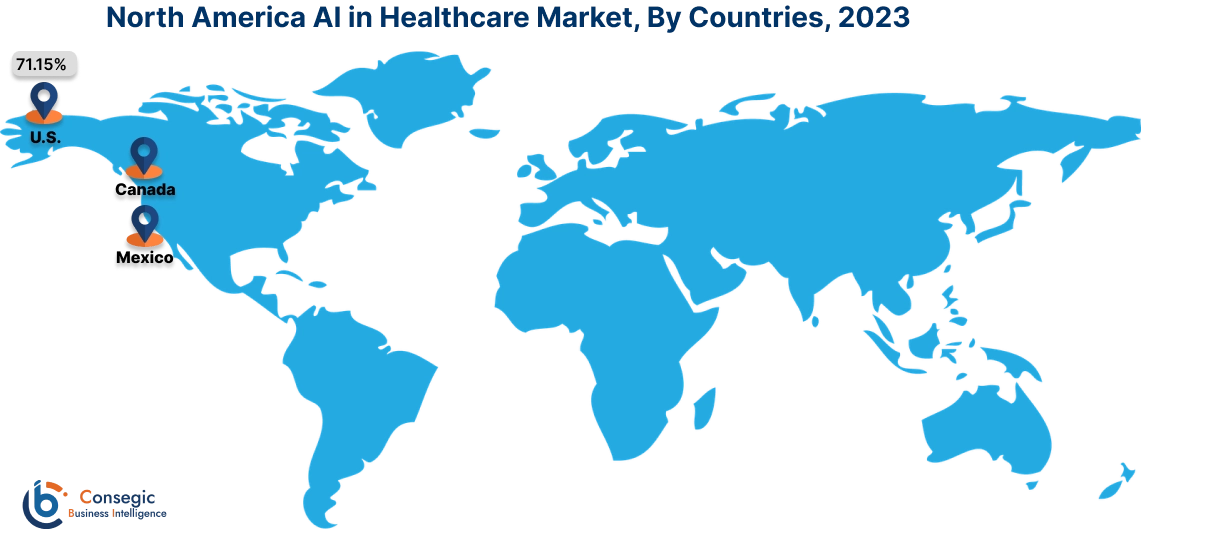
The Asia Pacific is experiencing the fastest growth for the market, with a CAGR of 34.2% over the forecast period. The development is attributed to factors such as rising healthcare expenditure and improvements in healthcare infrastructure. As the healthcare infrastructure develops it increases awareness about the benefits associated with the adoption of AI. Governments, healthcare organizations, and healthcare providers across the region are actively promoting the adoption of AI technology. This includes investments in AI-powered solutions across various healthcare segments, including medical imaging, drug discovery, and personalized medicine. These factors collectively influence the market in the Asia Pacific region.
Europe is experiencing significant expansion, driven by the increasing adoption of AI-powered solutions to improve patient outcomes and streamline healthcare processes. Additionally, Europe boasts well-established healthcare systems with a focus on innovation and patient care. The integration of AI into healthcare further enhances the quality and efficiency of these systems. Moreover, the region is increasingly investing in digital health initiatives, including the development of digital health records, wearable devices, and AI-powered healthcare solutions. AI-powered solutions are being implemented across various healthcare domains, including medical imaging, drug discovery, personalized medicine, and remote patient monitoring, driving the trend of the European AI in healthcare market. Collectively these factors are supporting the AI in healthcare market demand across Europe.
The Middle East and Africa region is witnessing a notable surge in AI in healthcare market demand. The growing healthcare sector in the Middle East is playing a pivotal role in driving the market. Many countries in the MEA region are investing in developing their healthcare infrastructure fueled by increasing disposable incomes, aging populations, and the rising prevalence of chronic diseases. This increased spending is driving the demand for advanced healthcare solutions, including the trend of AI-powered technologies. Moreover, initiatives to modernize healthcare systems, improve access to care, and enhance patient outcomes, growing interest in preventative care strategies, and an openness to deploying emerging technologies, are fueling the requirements for AI-powered solutions in the region.
Latin America is an emerging region in the AI in healthcare market. The region faces increasing healthcare costs and inefficiencies in traditional healthcare delivery models. AI technology offers a promising solution to address these challenges by enabling remote patient monitoring, telemedicine, and real-time data exchange. The rising middle class in Latin America is driving demand for better healthcare services. Increased awareness of health issues and a desire for advanced medical treatments are further fueling the growth of the market. The region's existing healthcare challenges, coupled with the transformative potential of AI technology, are poised to drive significant AI in healthcare market trends.
Top Key Players & Market Share Insights:
The AI in healthcare industry is highly competitive with major players providing products to the national and international markets. Key players are adopting several strategies in product innovation to hold a strong position in the global AI in healthcare market. Key players in the AI in healthcare industry include-
- IBM (U.S.)
- NVIDIA Corporation (U.S.)
- Intel Corporation (U.S.)
- Itrex Group (U.S.)
- Oracle (U.S.)
- Microsoft (U.S.)
- Amazon Web Services, Inc. (U.S.)
- Google (U.S.)
- Clarius (Canada)
- Oxipit (Lithuania)
Recent Industry Developments :
New Launches:
- In October 2024, Microsoft announced the launch of several artificial intelligence enhancements in Microsoft Cloud for Healthcare innovations. These innovations include new healthcare AI models on Azure AI Studio, advanced healthcare data capabilities within Microsoft Fabric, and developer tools on Copilot Studio.
- In October 2024, Amazon's hybrid primary care provider One Medical announced the launch of new AI-powered tools designed to streamline administrative tasks for its healthcare providers. These tools are built on Amazon's generative AI services, Amazon Bedrock, and AWS HealthScribe.
- In October 2024, Oracle announced plans to launch a new AI-powered electronic health record (EHR) in 2025. This next-generation EHR will leverage voice commands for navigation and search and integrate Oracle's clinical AI agent to provide data analysis and patient flow tracking tools.
- In October 2023,Samsung Medison, launched AI-automated measurement functions BiometryAssist and ViewAssist, which measure and automatically annotate fetal growth indicators in ultrasound. This highlights the adoption of AI in medical imaging systems including ultrasound systems.
Partnerships:
- In April 2023 , HCA Healthcare and Augmedix announced a partnership aimed at accelerating the development of artificial intelligence-enabled ambient documentation solutions for acute care providers. These use automatic speech recognition technology and natural language processing to convert clinician-patient conversations into medical notes. These notes are then reviewed and finalized by care teams before being integrated into electronic health records (EHRs).
AI in Healthcare Market Report Insights :
| Report Attributes | Report Details |
| Study Timeline | 2018-2031 |
| Market Size in 2031 | USD 189.55 Billion |
| CAGR (2024-2031) | 33.7% |
| By Technology |
|
| By Application |
|
| By End User |
|
| By Region |
|
| Key Players |
|
| North America | U.S. Canada Mexico |
| Europe | U.K. Germany France Spain Italy Russia Benelux Rest of Europe |
| APAC | China South Korea Japan India Australia ASEAN Rest of Asia-Pacific |
| Middle East and Africa | GCC Turkey South Africa Rest of MEA |
| LATAM | Brazil Argentina Chile Rest of LATAM |
| Report Coverage |
|
Key Questions Answered in the Report
How big is the AI in Healthcare market? +
In 2023, the AI in Healthcare market was valued at USD 19.27 Billion.
Which is the fastest-growing region in the AI in Healthcare market? +
Asia Pacific is the fastest-growing region in the AI in Healthcare market.
What specific segmentation details are covered in the AI in Healthcare market? +
Technology, Application, and End User segmentation details are covered in the AI in Healthcare market
Who are the major players in the AI in Healthcare market? +
IBM(U.S.), NVIDIA Corporation (U.S.), and Microsoft (U.S.) are some of the major players in the market.
